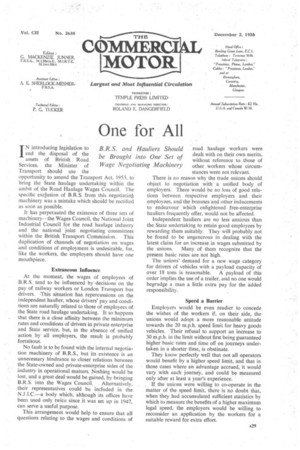One for All
Page 31

If you've noticed an error in this article please click here to report it so we can fix it.
IN introducing legislation to end the disposal of the assets of British Road Services, the Minister of Transport should use the opportunity to amend the Transport Act, 1953, to bring the State haulage undertaking within the ambit of the Road Haulage Wages Council. The specific exclusion of B.R.S. from this negotiating machinery was a mistake which should be rectified as soon as possible.
It has perpetuated the existence of three sets of machinery—the Wages Council, the National Joint Industrial Council for the road haulage industry and the national joint negotiating committees within the British Transport Commission, This duplication of channels of negotiation on wages and conditions of employment is undesirable, for, like the workers, the employers should have one mouthpiece.
Extraneous Influence At the moment, the wages of employees of B.R.S. tend to be influenced by decisions on the pay of railway workers or London Transport bus drivers. This situation has repercussions on the independent haulier, whose drivers' pay and conditions are naturally related to those of employees of the State road haulage undertaking. It so happens that there is a close affinity between the minimum rates and conditions of drivers in private enterprise and State service, but, in the absence of unified action by all employers, the result is probably fortuitous.
No fault is to be found with the internal negotiation machinery of B.R.S., but its existence is an unnecessary hindrance to closer relations between the State-owned and private-enterprise sides of the industry in operational matters. Nothing would be lost, and a great deal would be gained, by bringing B.R.S. into the Wages Council. Alternatively, their representatives could be included in the N.J.I.C.—a body which, although its offices have been used only twice since it was set up in 1947, can serve a useful purpose.
This arrangement would help to ensure that all questions relating to the wages and conditions of road haulage workers were dealt with on their own merits, without reference to those of other workers whose circumstances were not relevant.
There is no reason why the trade unions should • object to negotiation with a unified body of employers. There would be no loss of good relations between respective employers and their employees, and the bonuses and other inducements to endeavour which enlightened free-enterprise hauliers frequently offer, would not be affected.
Independent hauliers are no less anxious than the State undertaking to retain good employees by rewarding them suitably. They will probably not be found to be ungenerous in dealing with the latest claim for an increase in wages submitted by the unions. Many of them recognize that the present basic rates are not high.
The unions' demand for a new wage category for drivers of vehicles with a payload capacity of over 18 tons is reasonable. A payload of this order implies the use of a trailer, and no one would begrudge a man a little extra pay for the added responsibility.
Speed a Barrier Employers would be even readier to concede the .wishes of the workers if, on their side, the unions would adopt a more reasonable attitude towards the 20 m.p.h. speed limit for heavy goods vehicles. Their refusal to support an increase to 30 m.p.h. in the limit without first being guaranteed higher basic rates and time off on journeys undertaken in a shorter ttme, is obstinate.
They know perfectly well that not all operators would benefit by a higher speed limit, and that in those cases where an advantage accrued, it would vary with each journey, and could be measured Only after at least a year's experience.
If the unions were willing to co-operate in the matter of the speed limit, there is no doubt that, when they had accumulated sufficient statistics by which to measure the benefits of a higher maximum legal speed, the employers would be willing to reconsider an application by the workers for a suitable reward for extra effort.












































































































